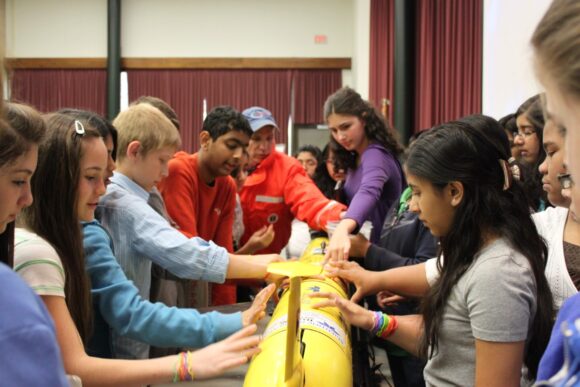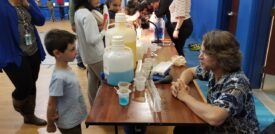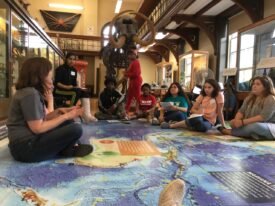
Distinguished Professor Scott Glenn (Center for Ocean Observing Leadership or COOL) discusses ocean gliders with a group of middle school students attending an Ocean Day community event.
Rutgers University and the University of Missouri-Columbia recently received a $750,000 grant from the National Science Foundation (NSF) to develop online tools to help university researchers connect their research with society. The National Science Foundation (NSF), as part of its granting requirements, encourages researchers to provide opportunities for the public to engage and share their findings with policy makers, educators and the general public. NSF calls this type of community engagement in research, broader impacts. Researchers are asked to consider “How can my work benefit society? How can it help solve challenges facing communities? How can I partner with communities to expand the exchange of information, ideas, and expertise in ways that benefit society?

Adam Kuska (Rutgers Newark) speaks to a future scientist from the Greater Brunswick Charter School at the Community Ocean Night.
This new toolkit will support scientists, engineers and other researchers in planning and developing education and outreach projects that support and explain their work. “Ultimately, my job is to help researchers find innovative ways to share the exciting science and engineering projects they are doing with a broader range of audiences,” said Janice McDonnell, a science engineering technology agent in the Department of 4-H Youth Development at Rutgers University-New Brunswick. “This is critical in an era of increased skepticism about the impact and value of science and a time when we need to build a competent and productive STEM workforce.”
“We must come up with tools that help researchers partner with communities to think about their research beyond just communicating with their peers,” said McDonnell, ARIS Center co-principal investigator and PI of this new grant effort. “Often times, researchers do not have formal training in science communication. Their expertise is in the science itself! It is important to support their work and provide meaningful tools that help them think about the bigger picture of how their work can benefit society. Researchers must think about how they will work with communities and the public to understand and sometimes even participate in university research.”

Geologist and educator Christine Bean works with 4-H STEM Ambassadors at the Rutgers Geology Museum to plan community STEM programs.
Ten universities will collaborate in this new project, including University of California – Merced, University of Texas – Dallas, and University of Nebraska – Lincoln, to help field test the tools. An additional seven universities will be selected over the next three years to participate in the field tests. The tools will be interactively designed to assist researchers with the development and assessment of plans that accompany research proposals submitted to the NSF and will include video resources, tutorials, example case studies, rubrics to help assess their work, and checklists to help them apply established effective practices from the education and outreach field.
Ultimately, this work is beneficial to researchers who are responsible for driving discovery, to practitioners who collaborate with researchers and community stakeholders and to the public who benefit from research and education advancements. This work is part of the Center for Advancing Research Impact in Society (ARIS), also funded by the NSF. Established in 2018, the ARIS is housed at the University of Missouri- Columbia and is responsible for developing a collaborative network of broader impacts professionals across the United States. The ARIS Center emphasizes support for serving traditionally underserved populations while providing inclusive public engagement to ensure a diverse science workforce.

